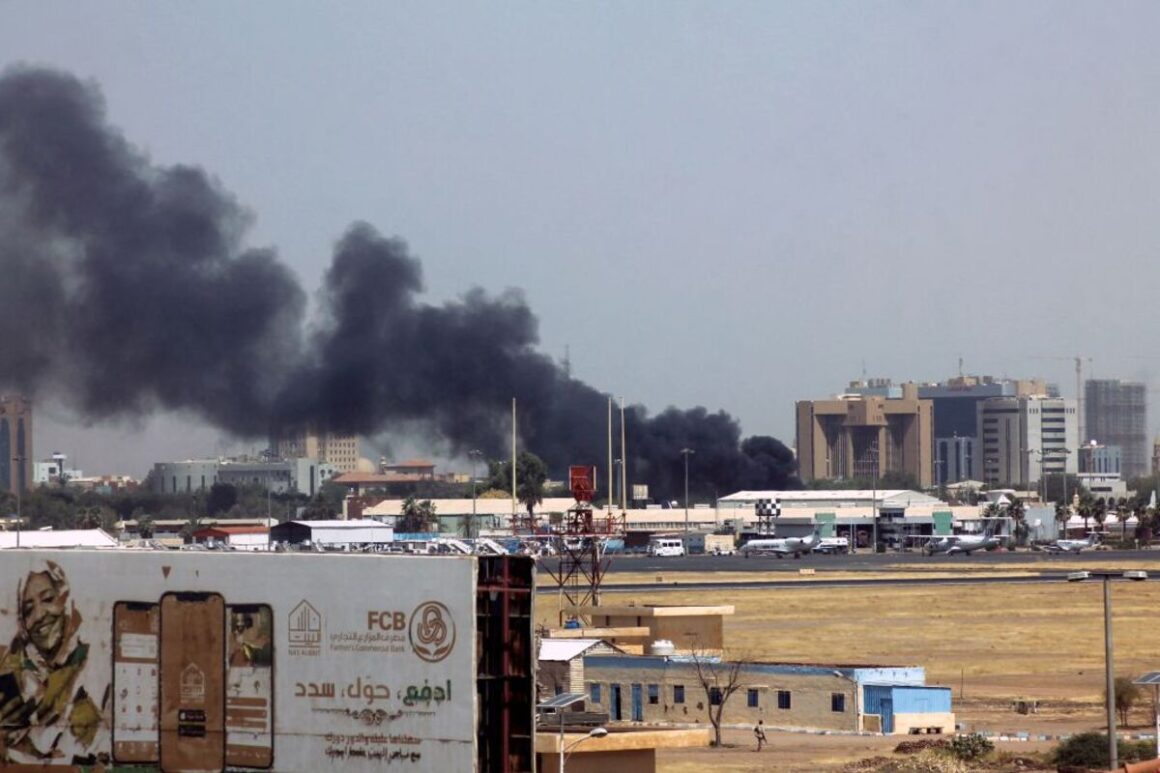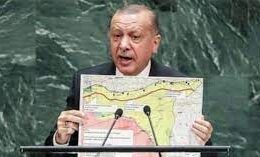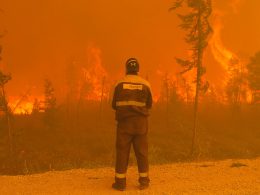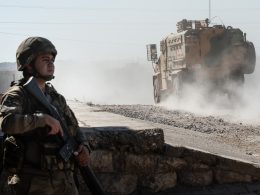By Serge Jordan, International Socialist Alternative (the international movement to which we are the Irish section of)
Since the early morning of Saturday, 15 April, the chiefs of the Sudanese armed forces and the Rapid Support Forces (RSF) militia have been waging open warfare with each other. The people of Sudan are caught in the crossfire of a fratricidal battle for power between the two most violent wings of the counter-revolution.
Terrified residents are trapped inside their houses in the capital Khartoum as urban warfare and air strikes have raged across the city for five days. According to the Central Committee of Sudanese Doctors, close to 200 civilians have been killed since the fighting began, and many hundreds injured. This is surely a grave underestimate, as many bodies are lying uncollected on the streets. A ceasefire internationally brokered on Tuesday collapsed within hours.
internationalsocialist.net was able to speak briefly to Ahmed, an ISA sympathiser living in Omdurman, Khartoum’s twin city across the Nile. He describes: “The situation is very bad. It seems like the fighting will carry on for a long time. There are already two hospitals out of service in my area alone. Medical and food supplies are running out and there is no way to step out of our houses right now. The situation in the neighbourhoods around the army positions and around the strategic places in Khartoum are worse. They have no electricity or water for the fourth day in a row.”
Reports of heavy looting, of rape, and of people fleeing their destroyed houses abound, as all the horrors of war have made their way into the heart of the capital. Although the first clashes broke out in Khartoum, they have rapidly spread across multiple parts of the country.
Who is fighting?
Not so long ago, the RSF’s leader, warlord Mohamed Hamdan Dagalo (also known as “Hemedti”), and the commander of the Sudanese army, General Abdel Fattah al-Burhan, were counter-revolutionary partners in crime. The latter became head of the Military Council and the former its deputy after longtime dictator Omar al-Bashir was removed from power by the generals following a mass revolutionary uprising in April 2019.
The two men were the masterminds of the massacre of revolutionary protesters at a sit-in in front of the army headquarters in Khartoum in June of the same year. They orchestrated the military coup of October 2021, which brought an end to the “power-sharing” framework that had provided a civilian facade to the power of the military junta for two years. But the uneasy alliance between the RSF militia and the generals has since turned completely sour.
In reality, the conflict between these forces had been brewing for many years. The RSF is a paramilitary offshoot from the infamous Janjaweed, made up of Arab tribes that were used and armed by al-Bashir’s regime in the early 2000s to wage a genocidal war against the people of the Western Darfur region. They were recycled into the RSF in 2013 as a sort of “second column” of the regimes’ defence, in part to counterbalance the power of the army.
The RSF was bolstered and funded by the European Union as ruthless “border guards” to stop the influx of migrants from Sudan, and by the Gulf States as mercenaries in the war against the Houthis in Yemen. Through this, Hemedti and his clique managed to build international influence, and to enrich themselves massively in the process. Their business interests expanded along with their ambitions.
After the revolution and the toppling of al-Bashir, the RSF grew stronger, and so did the rivalry between the two armed forces and their respective spheres of influence — despite their united efforts to crush the revolutionary aspirations of the masses. Both Hemedti (now one of the richest men in the country) and the military top brass have their hands all over various sectors of the formal and informal economy, in particular the very lucrative export of gold.
The military coup of October 2021, far from bringing a bloody end to the revolution as both had expected, revived instead an enduring process of widespread popular resistance, with mass strikes, demonstrations and road blockades breaking out throughout the country. This accelerated the jostling for power between the RSF and the army leaderships. While stepping up repression, al-Burhan also stacked military officers, Islamists from al-Bashir’s National Congress Party and other old regime loyalists into various state positions, to play them off against the mounting influence of Hemedti’s RSF.
From mid-2022, as the country sunk further into crisis, Hemedti started arguing that the coup (which he had previously praised as a “corrective action”) had made the country worse off, and that it had become a gateway for affiliates of the former regime to make a comeback. This mass murderer began rebranding himself as a supporter of democracy and of civilian rule, and called for the military to “return to its barracks”. In recent weeks, tensions escalated over the application of a UN-backed “framework agreement” signed last December, which both sides wanted to use as a way to curb each other’s power, and over al-Burhan’s attempt to fold the RSF into the armed forces.
Now, the daggers are out. Hemedti took to Twitter on Monday to plead with imperialist powers for support, calling al-Burhan “a radical Islamist who is bombing civilians from the air”, while al-Burhan has openly called for the dissolution of the RSF. Because of the fire power and numerical strength of both camps, and the complex web of competing interests at stake (each faction is backed by a myriad of regional and international players), a protracted conflict could be on the cards, and even drag regional forces into the fighting.
Revolution betrayed
All the main world powers have been quick to condemn the ongoing violence. But these are the same powers who have continuously collaborated with the battling generals and warlords, appeasing them and giving them a seat at their supposedly “democratic” table while their forces were busy slaughtering the Sudanese people on the streets. Once again, the Biden administration’s rhetoric about “supporting democracy” has shown itself for what it really is.
Embodied in the slogan of their neighbourhood-based ‘Resistance Committees’, “No Negotiations, No Partnership, No Legitimacy”, the majority of working and poor people in Sudan have rejected all along any deal with the military junta. The framework agreement signed between the army generals and the umbrella group of political forces called the ‘Forces of Freedom and Change’ (FFC), and supported by the European Union and by the QUAD for Sudan (namely Saudi Arabia, the United Arab Emirates, the United States and the United Kingdom), was nothing but an umpteenth attempt to resurrect the masquerade of a “democratic transition” with the oppressive and corrupt counter-revolutionary butchers who hold economic, political and military power in the country — despite them having killed at least 125 anti-coup protesters and tortured so many more since their October 2021 coup. This deal triggered a renewed wave of protests across Sudan earlier this year for that very reason.
Today, it is abundantly clear that no trust can be had in any of the major or regional capitalist powers to resolve this crisis. Indeed they are responsible in so many ways for having fueled it in the first place. Nor can the masses in Sudan trust any of the formal “opposition” parties, all of which have, at some point or another, to one degree or another, stabbed their demands for justice and their revolutionary aspirations in the back — channelling their years-long struggle into rotten deals with the counter-revolution.
In contrast, the thousands of Resistance Committees that have sprung up across the country in recent years have refused to take part in any such arrangements with the military and paramilitary forces. Ahmed explains that even as they are in the crossfire of bloody street battles, these committees have heroically been helping people access medical assistance and food supplies, by coordinating with local stores and pharmacies.
As vital as this is, an action plan should also be laid out to systematically organise the collective self-defence of the population in every neighbourhood, as the spectre of further killings and other atrocities looms large. Ultimately, the revival of the Sudanese revolution, based on the strengthening and coordination of its own bodies of struggle against all the reactionary and plundering armed factions, and organised around a socialist programme aimed at neutralising and expropriating these criminals, is the only way to put an end to this bloodshed and to the misery experienced by the Sudanese people.
Further analysis on these important events will be published on ISA’s website in the next few weeks.












